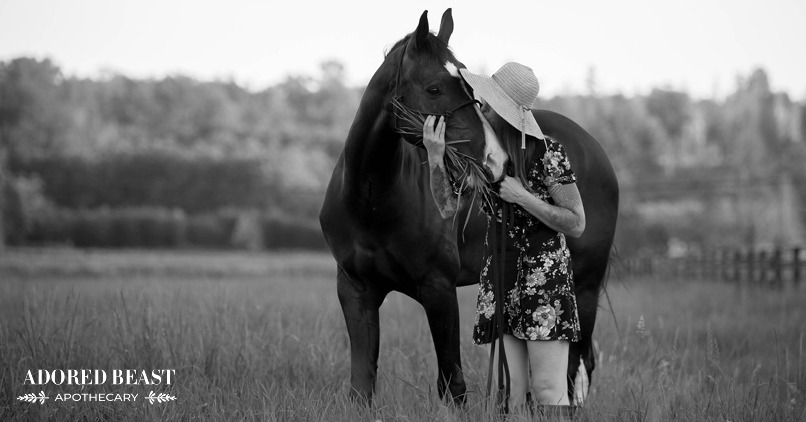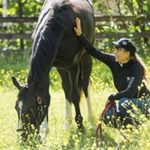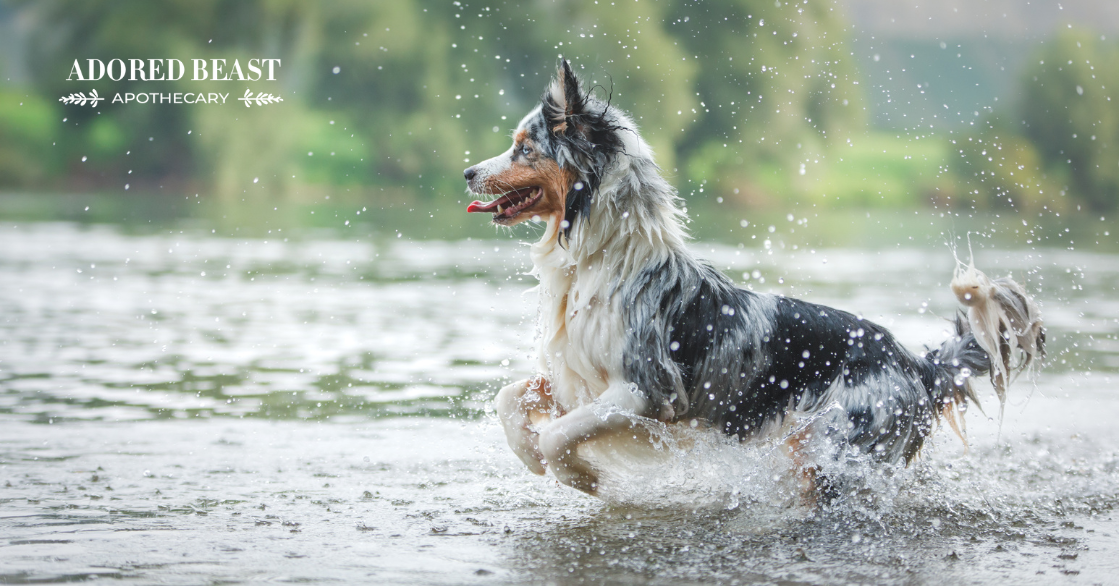The skin is the external barrier that protects the internal body systems. It is literally a barrier to the outside world that protects your horse from everything the environment might throw at them. And, it can give us clues as to how an animal is functioning internally.
Many horses struggle with equine skin disease, the common ones being sweet itch, mud fever, rain scald, and more. When any of these become chronic, it can be a vital clue about where to start in helping them recover.
Assessing Equine Skin Disease
When you’re trying to find solutions to help your horse, it’s important to identify what type of issue they are having. Horses mainly suffer from fungal, bacterial, and parasitic skin infections but they can also struggle with warts and cellular changes (eg. sarcoids). Topical treatments can be relieving in the short term, but will not fix the underlying reason for their prevalence. Each scenario requires a slightly different protocol, but horses struggling with any type of infestation (equine skin disease) should receive gut and immune-supportive assistance.
1. Fungal Infections
Fungal infections, including ringworm, are a sign of a compromised immune system. This could be related to the integrity of the skin barrier, environmental factors (eg. very rainy or humid weather), and individual sensitivity.
When you’re dealing with fungus, it’s important to provide overall immune system support including gut and skin-supportive herbs (including echinacea, marshmallow root, and slippery elm) and a low-starch diet along with probiotics. If the skin microbiome is unstable, it’s likely the gut microbiome is also suffering. Diluted herbal calendula and therapeutic tea tree rinses followed by a probiotic rinse can be useful. Gentle shampoos such as castile or coconut soap can provide relief. Don’t forget that funguses are part of the microbiome too! They can become out of balance in relation to the rest of the skin microbiome if the community is disturbed in some way. A gut disturbance, over-use of antibiotics, stress or heavy rain could all contribute.
Blanketing your horse in very wet weather may be needed to keep the moisture off of them. Sometimes, clipping the affected areas is essential for drying the skin properly and ensuring that fungus and bacterial growth isn’t promoted.
2. Bacterial Infections
Bacterial infections are common in horses and can produce chronic conditions such as sweet itch, rain rot, and mud fever. These are all the result of a compromised immune system and skin barrier. They can be worsened by wet weather conditions or in hot climates where insects are in full force.
Horses with these issues benefit from rain and bug protection while you address the internal issue. Gut support is essential, as is skin-supportive nutrition including omega 3 fatty acids (from flax, chia or algae – not fish oil), vitamin E and zinc. Many horses are zinc- and vitamin E-deficient so it’s important to ensure your horse is getting enough. Look for a vitamin E supplement in liquid form – d-alpha tocopherol (naturally sourced).
Topical anti-microbial herbal poultices and aromatherapy can be useful for affected areas. Herbs include calendula, clivers, and marshmallow. Aromatherapy should always be diluted with a carrier oil before application and can be used with beeswax to form a protective barrier against moisture while allowing the skin to heal.
For mud fever, keeping the affected areas clipped and free of excess hair is important. Poultices can work well when applied regularly until the affected areas are clear.
Here are two great recipes for poulticing horses with mud fever:
Recipe #1: In a plastic container (not metal), mix with a wooden spoon, mix:
- ½ cup bentonite clay
- 1 cup water
- 2 tbsp witch hazel
- 0.5 mls calendula herbal tincture
- 0.5 mls clivers herbal tincture
- 0.5 mls marshmallow herbal tincture
Recipe #2: Mix the following (this recipe is wonderful for mud fever and feather mites too):
- ½ cup bentonite clay
- 1 cup apricot kernel oil or olive oil
- 2 tbsp witch hazel
- 12 drops of each of the following therapeutic grade essential oils:
- lavender
- tea tree
- clove
- lemon peel
- thyme
- rosemary
For both of these, apply to your poultice material and wrap daily for 7-10 days or longer if needed. Store excess in a sealed glass jar in a dark cupboard for future use. Do not use metal lids to store since bentonite clay can react with metal, reducing its effectiveness.
Alternatively, if you want to purchase something pre-made, this product is fantastic for protection and improvement of mud fever and thrush in wet conditions. You can use this product without poulticing but it is advised to clip and dry the affected areas before applying and poultice with one of the following recipes above for 7-10 days prior to using it.
3. Warts and Sarcoids
Warts and sarcoids are another immune-mediated issue in horses. Gut health is equally important for these horses and homeopathy can also be useful. The homeopathic remedy Thuja 30C can be effective for assisting with both warts and sarcoids.
Young horses and older horses are most often affected by warts and growths. It is an indicator to increase your efforts to support your horses’ gut health (80%+ of the immune system) and to provide a clean, species appropriate diet.
4. Parasites
Lice, mites, and mange often affect young and elderly horses or those who have underlying health conditions. They are opportunistic in nature. In herd situations, they can sometimes affect certain animals while others in the same herd remain unaffected. They’re a reflection of individual internal health and good sign to re-asses your horse’s wellness plan.
Initial veterinary treatment may be warranted, but a long term plan should also be established for prevention and immune system support. A balanced, high-fibre, low starch diet along with targeted supplementation is often the best solution for long term results.
If you’re not sure where to start with nutrition, it’s a great idea to ask your veterinarian to do a nutrient panel to check for nutritional deficiencies in your horse.
Keep haircoat short and clean while trying to get lice or mites under control. See the poultice recipe above for mud fever and feather mites.
For internal parasites, consider fecal testing several times a year instead of automatically deworming your horse. Testing along with external clinical signs can often reveal any internal parasite overload your horse might be struggling with. Deworming medications can disturb the gut biome and, therefore, the immune system.
Internal Support for External Success
Before reaching for the anti-microbials, anti-fungals, and anti-parasitics for equine skin disease, it’s important to think about long term planning. While very serious cases may require veterinary intervention, realize that drugs will not help your horse recover from an immune system issue. In fact, in some cases, it can actually exacerbate the problem without a long term plan in mind.
Chronic equine skin disease is not easily fixed with medications alone. Work with your veterinarian, an equine nutritionist, and a holistic equine professional to come up with a personalized plan for your horse for long term recovery.












